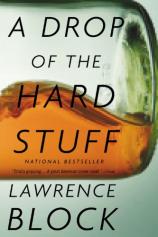Interview: May 27, 2011
In 1993, Lawrence Block was named a Grand Master by the Mystery Writers of America. Certainly his long-standing series about P.I. Matthew Scudder and gentleman burglar Bernie Rhodenbarr helped earn him such a prestigious title. One of America's most acclaimed crime writers, Block pleases his longtime fans with the release of A DROP OF THE HARD STUFF, a noir book that finds Scudder facing his demons against the backdrop of 1980s New York City. Bookreporter.com's Tom Callahan, a longtime fan himself, speaks with Block about bringing back characters and filling in the gaps of Scudder's interesting life. He also discusses re-releasing older works as eBooks, writing under various pen names, and pushing the envelope, in more ways than one.
Bookreporter.com: Many longtime fans were alarmed a few years back when you wrote in your memoir, STEP BY STEP, that your series characters might have reached a good end point, and indeed, you might retire from writing. What made you decide to do this Matthew Scudder book, A DROP OF THE HARD STUFF?
Lawrence Block: Well, I thought of a way to go on.
BRC: You set this book back in the early 1980s. There was a gap of several years in Scudder's life at this time, right? So was this a natural point to fill in the story?
LB: Exactly. That's what struck me, and the story that developed was one that fit right into Scudder's history.
BRC: Did you have to do much reading of newspapers from that era to refresh your memory and provide historical accuracy, especially because so many places, like restaurants, change so quickly in New York City?
LB: No, perhaps because (a) it IS fiction, after all, and most of the restaurants and bars are invented to begin with, and (b) Scudder's world is a small one, and what's happening in the rest of the world never matters much in the context of the books. I didn't bother with research, I just let myself slip back into that time. There may be anachronisms, though I'd prefer it if there aren't, but I think the book feels right, and that's what's most important to me.
BRC: It's interesting that you got to bring back characters readers enjoyed, like Jim Faber and Jan Keane, from that period. Did you have to reread all you had written about them before in order to re-imagine them now?
LB: No, I just trusted my memory. If there's an inconsistency or two, well, you have to remember that this is Scudder telling us the story. Maybe his memory's at fault. I mean, the old boy's getting up there in years.
BRC: This period is considered by many to be when the Scudder series really took off and got much darker and grittier --- indeed, when it became one of the greatest PI series of all time. Did you realize back then when writing a book like EIGHT MILLION WAYS TO DIE and CUTTING EDGE that you were creating something very special here?
LB: First, thanks. What I did realize, while writing EIGHT MILLION WAYS TO DIE, was that I was taking a chance, writing such a lengthy first-person detective story. It was twice as long as the earlier books in the series, and that's a long time to have one guy's voice droning in your ear. Don Fine, publisher at Arbor House, never took exception to the length, or indeed to anything else about the book, and it was well received in all quarters.
BRC: One of the things that makes your work so enjoyable is that you write seamlessly, effortlessly, if that makes any sense. In the intro to the new edition of BUTCHER'S MOON by Donald E. Westlake, writing as Richard Stark, you mention that you both worked by what Donald called the "narrative push method" in that you "keep writing and see where it goes." Is that how you did A DROP OF THE HARD STUFF?
LB: Uh-huh. I believe it was Theodore Sturgeon who observed that, if the writer doesn't know what's going to happen next, he doesn't have to worry that the reader will know what's going to happen next. With A DROP OF THE HARD STUFF, I knew very little about the story when I began writing it.
BRC: I see also that you are releasing a lot of your early books, often written under other names, as electronic books. What made you decide to do that? Do you ever find things you wrote 50 years ago and have the temptation to change them around a bit?
LB: I've always wanted my work to be available to readers. You mentioned Don Westlake; when he arranged for Hard Case Crime to bring out his first novel, THE CUTIE (originally THE MERCENARIES), Otto Penzler asked him Why bother? as there wasn't much money involved, so why have the book back in print? Don's reply was that the difference between being in print and being out of print is the difference between being alive and being dead.
So that's part of it. I'd rather my books be alive than dead, and the eBook medium makes it possible to keep available those backlist works that could not otherwise be profitably published. As for the pseudonymous books, I've decided not to sit in judgment of my own work. I'm also in the special position of having had a lot of other writers use various pen names of mine; by only republishing the books I actually wrote, I'm able to underscore just which books are mine. They now have my name on them: "Lawrence Block writing as Sheldon Lord." Or Andrew Shaw, or Lesley Evans, or Anne Campbell Clark.
BRC: Hard Case Crime is being re-launched this September with the hardcover release of your book, GETTING OFF, which you are writing under the name Jill Emerson. Besides having maybe the best noir cover art that I have ever seen, what can you tell us about this book and the work of Ms. Emerson?
LB: Why a pen name? Well, it pushes the envelope in both eroticism and violence --- you might even say it rips the envelope open, or shreds it --- and after the reception my novel SMALL TOWN got in certain quarters, I wanted to make sure my longtime readers knew what they'd be getting into (or getting off on, if you prefer). So I published it with an open pen name --- "Lawrence Block writing as Jill Emerson" --- and with a subtitle: "A Novel of Sex & Violence."
It's the story of an attractive and personable young woman who picks up men, goes home with them, has sex with them, and then kills them. I should be embarrassed to say it, but I absolutely love this book. I can't remember ever having had more fun writing anything. And the cover's really something, isn't it?
About Jill's other work, well, it runs the gamut. Her first two books are WARM & WILLING and ENOUGH OF SORROW: two sensitive novels of the lesbian experience. Then she wrote three structurally experimental and candidly erotic novels: THIRTY, THREESOME and A MADWOMAN'S DIARY. Next came an overblown "Peyton Place"-type novel set in Buck County, THE TROUBLE WITH EDEN. And, finally, Arbor House published A WEEK AS ANDREA BENSTOCK, a serious mainstream novel serialized in Redbook.
So she's no Jilly-come-lately. And all of her early books, I should note, are widely available as Open Road eBooks.
BRC: You also have returned to writing a monthly column about the craft for Mystery Scene magazine. You are telling some wonderful stories there about hard-boiled, often pulp fiction writers, some of them largely forgotten. Is it true that the great Charles Willeford once asked you if you ever ate cat and said you looked like the type who might have done it? That must have driven the conversation right off the cliff.
LB: It was a memorable moment. Charles was one of a kind. I wish I'd had a chance to know him better, and that we'd had him with us a little longer.
BRC: Are there any plans for another novel?
LB: Sort of. But it's too early to talk about it.
BRC: Finally, how is the racewalking going?
LB: Oh, God, don't ask. People talk about exercise in its various forms being addictive. Well, maybe. But not walking (or running, or whatever) is far more addictive. All it takes is a couple days of inactivity to hook me through the bag and back again, as the heroin enthusiasts used to say.
Oh, I'll get back to it. But, uh, not today.
• Click here now to buy this book from Amazon.




